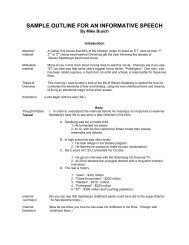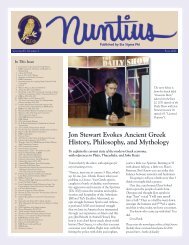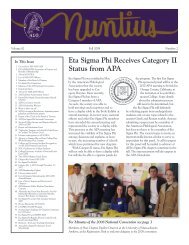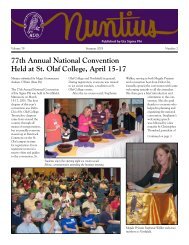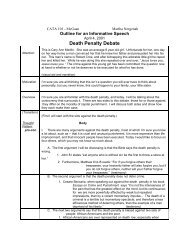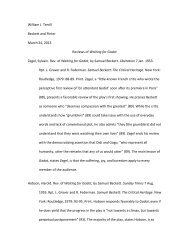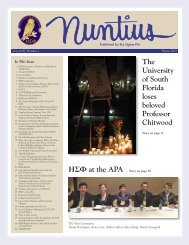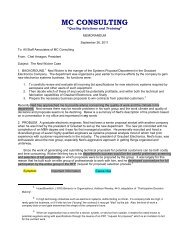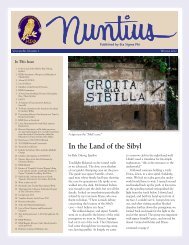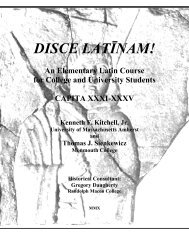Oscar Wilde, The Critical Heritage
Oscar Wilde, The Critical Heritage
Oscar Wilde, The Critical Heritage
You also want an ePaper? Increase the reach of your titles
YUMPU automatically turns print PDFs into web optimized ePapers that Google loves.
Ryan Cameron<strong>Oscar</strong> <strong>Wilde</strong>Professor Hale23 February 2013Annotated BibliographyUnsigned Review, by Anonymous. <strong>The</strong> <strong>The</strong>atre, 1 March 1895: 169-70. Rpt. in <strong>Oscar</strong> <strong>Wilde</strong>:<strong>The</strong> <strong>Critical</strong> <strong>Heritage</strong>. Ed. Karl Beckson. New York: Routledge, 1997: 199-200. PrintThis review is critical more of the lower-class British public than of <strong>Wilde</strong> himself,saying that they are less intelligent and therefore more likely to enjoy <strong>Wilde</strong>'s workswhich the author claims are designed to cater to the lower classes. <strong>The</strong> authorwonders how long <strong>Wilde</strong> can keep up this charade of showmanship. He argues that ifone were to take out all of the "<strong>Oscar</strong>isms" from this play, it would not be remotelyentertaining.Unsigned Review, by Anonymous. <strong>The</strong> Truth, 21 February 1895: 464-5. Rpt. in <strong>Oscar</strong> <strong>Wilde</strong>:<strong>The</strong> <strong>Critical</strong> <strong>Heritage</strong>. Ed. Karl Beckson. New York: Routledge, 1997: 191-93. PrintWhile the review opens scathingly, the author stating that they have "not the slightestintention of seriously criticizing Mr. O. <strong>Wilde</strong>'s new piece," they do admit to liking it, butonly for a short period of the review. Over half of the review devotes itself to talkingabout how <strong>Wilde</strong> thinks too highly of himself, and that the author thinks his popularity isfleeting.
William Archer on <strong>The</strong> Importance of Being Earnest, by William Archer. <strong>The</strong> World, 20February 1895: 50-60. Rpt. in <strong>Oscar</strong> <strong>Wilde</strong>: <strong>The</strong> <strong>Critical</strong> <strong>Heritage</strong>. Ed. Karl Beckson. NewYork: Routledge, 1997: 189-91. PrintArcher says that <strong>Wilde</strong>'s play is good, but only to see. He claims that there is little tofind in terms of criticism and edifying text in Earnest, and therefore does not go muchinto detail on what things might mean in the play as a critic normally would, but rathergives a play-by-play of what happened on stage.William Archer on the loss to British drama, by William Archer. William Archer,life, work, andfriendships, 1 May 1895: 215-16. Rpt. in <strong>Oscar</strong> <strong>Wilde</strong>: <strong>The</strong> <strong>Critical</strong> <strong>Heritage</strong>. Ed. Karl Beckson.New York: Routledge, 1997: 201. PrintThis article is not exactly about <strong>The</strong> Importance of Being Earnest, but it is highly criticalof British Drama, which the author feels has fallen by the wayside in recent years. He wishes<strong>Wilde</strong> would grow and become a better playwright, but he never does, in his opinion.Reception of <strong>The</strong> Importance of Being Earnest, by Hamilton Fyfe. <strong>The</strong> New York Times, 17February 1895: 1. Rpt. in <strong>Oscar</strong> <strong>Wilde</strong>: <strong>The</strong> <strong>Critical</strong> <strong>Heritage</strong>. Ed. Karl Beckson. New York:Routledge, 1997: 188-89. PrintFyfe praises <strong>Wilde</strong>'s play, saying that he "has not heard such unrestrained, incessantlaughter from all parts of the theatre" since a work called Charley's Aunt was broughtto London stages. He decrees that <strong>Wilde</strong> has defeated his critics in writing thiscomedy.Earnest Newman on <strong>Wilde</strong>'s genius for paradox, by Earnest Newman. <strong>The</strong> Free Review, 1 June
1895: 193-206. Rpt. in <strong>Oscar</strong> <strong>Wilde</strong>: <strong>The</strong> <strong>Critical</strong> <strong>Heritage</strong>. Ed. Karl Beckson. New York:Routledge, 1997: 202-10. PrintThis also does not focus on <strong>The</strong> Importance of Being Earnest, but rather on <strong>Wilde</strong>'spenchant for paradoxical statements. Newman believes that the British public is toounintelligent to realize that these paradoxical statements, or "<strong>Oscar</strong>isms," are not meantto be taken seriously and end up doing so. He argues that <strong>Wilde</strong> is a brilliant thinkerand satirist, and these paradoxes are his art form.George Bernard Shaw on <strong>The</strong> Importance of Being Earnest, by George Bernard Shaw. <strong>The</strong>Saturday Review, 23 February 1895: 249-50. Rpt. in <strong>Oscar</strong> <strong>Wilde</strong>: <strong>The</strong> <strong>Critical</strong> <strong>Heritage</strong>. Ed.Karl Beckson. New York: Routledge, 1997: 194-95. PrintShaw opens by saying he is sure that <strong>Wilde</strong> must have written this play before his first,Lady Windermere's Fan, and then touched it up based on the reviews and critiques ofthat work, because it is far more commercial and not as well done in his opinion. He isparticularly critical of the muffin scene at the end of act two, calling it Gilbertian as manyother reviewers did, but not in a positive way. He goes on to criticize the public foreating up even <strong>Wilde</strong>'s bad works.A.B. Walkley, on <strong>The</strong> Importance of Being Earnest, by A.B. Walkley. <strong>The</strong> Speaker, 23 February1895: 212-13. Rpt. in <strong>Oscar</strong> <strong>Wilde</strong>: <strong>The</strong> <strong>Critical</strong> <strong>Heritage</strong>. Ed. Karl Beckson. New York:Routledge, 1997: 196-99. PrintThis review is mostly positive, opening by stating that wilde has "found himself at last asan artist in sheer nonsense," which Walkley makes sure to note is not a joking statementon his part. He claims that in being nonsense, the play is enjoyable in a way that <strong>Wilde</strong>'s
last play was not. He goes on to focus not so much on the play but on historical plays byShakespeare and the Greeks and how audiences reacted to them.H.G. Wells on <strong>The</strong> Importance of Being Earnest, by H.G. Wells. <strong>The</strong> Pall Mall Gazette, 15February 1895: 4. Rpt. in <strong>Oscar</strong> <strong>Wilde</strong>: <strong>The</strong> <strong>Critical</strong> <strong>Heritage</strong>. Ed. Karl Beckson. New York:Routledge, 1997: 187-88. PrintWells gives a favorable review of <strong>Oscar</strong> <strong>Wilde</strong>'s <strong>The</strong> Importance of Being Earnest,despite, by his own admission, giving a highly critical review of his last work, An IdealHusband. He refers to <strong>Wilde</strong>'s comedic style as being "Gilbertian," and praises theridiculousness of the plot element of the handbag, as, he says, it is at place in acomedic work like this.



